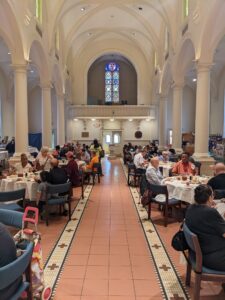Every week or two, Assisting Bishop Mary Glasspool writes a letter to clergy. There’s a theme to each letter, and she wrote recently about prayer (specifically corporate prayer; prayer within worshipping communities). She included this quotation from a book written in 1990 by Garrison Keillor, which mentions Holy Apostles:
Back in Minnesota, where words like “tuna hotdish”, or “Chicken” or “Lutheran” always got a laugh, and a great joke might be one about Lutherans eating tuna hotdish and feeding the rest to their chickens, “Episcopalian” was also mighty funny, especially if a Lutheran became one. To me … a Lake Wobegonian moving to Minneapolis and turning Episcopalian was a case of social climbing straight up the hill, no doubt about it. Our clear picture of Episcopalians was of wealthy people. Yale graduates, worshipping God in extremely good taste. Episcopalian was the church in wingtips, the Church of the Scotch and soda. So when I moved to New York and walked into Holy Apostles, I was surprised to see no suits. Nobody was well dressed. A congregation of a hundred souls on lower Ninth Avenue, a church with no parking lot, which was in need of paint and the sanctuary ceiling showed water damage, but which managed (I learned the next week) to support and operate a soup kitchen that fed a thousand New Yorkers every day, more than a million to date. Black faces in the sanctuary, old people, exiles from the Midwest, the lame and the halt, divorced ladies, gay couples: the real good anthology of the faith. I felt glad to be there. When we stood for prayers, bringing slowly to mind the goodness and the poverty of our lives, the lives of others, the life to come, it brought tears to your eyes, the simple way Episcopalians pray.
I had never seen this passage before, but I wrote to Bishop Mary and told her how I laughed in recognition when I read these words. It made my day, and I assured her that, other than an increase in meals served and a fresh coat of paint on the walls, CHA is still very much the beautiful, authentic, prayerful community described above.




